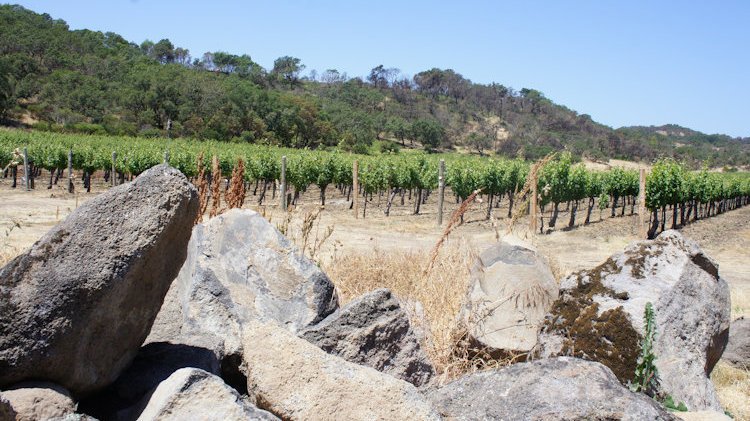Volcanic Wines – Magic Behind Napa’s Atlas Peak Mountain
“Wine is one of the most civilized and natural things of the world that has been brought to the greatest perfection, offering a greater range for enjoyment and appreciation than, possibly, any other purely sensory thing.” ~ Ernest Hemingway
Only three percent of the wine grapes grown in California are grown at altitudes above 1,000 feet in elevation with some of the most uniquely fascinating wines sharing a common characteristic, volcanic rocky soils. About 30 million years ago, massive volcanic eruptions covered the entire Northern California region, but, over the course of thousands of years, only select parts of Napa’s vineyard growing areas contain these volcanic soils. Their soil composition is a direct result of volcanic eruptions, which determines how much igneous, lava gravel rock the soil contains. There’s clearly a discernible difference to the grapes grown high in Napa’s volcanic mountain terroir.
Eminent and highly influential Canadian Master Sommelier, wine critic and one of the world’s foremost authorities on the subject of Volcanic wines, John Szabo, says of Napa’s volcanic mountain wines: “Genuine mountain wines are born from stony, low-fertility, free-draining hillsides. They’re denser, darker, quite often more tannic, yet more evenly ripe at lower alcohol, and they age magnificently. The vines themselves grow more slowly, they struggle and naturally yield less fruit per hectare. For a vine it’s probably hell. For a winemaker, and wine drinkers, it’s much closer to heaven. And some of the highest and most rugged Napa vineyards are planted in theAtlas Peak AVA, at up to over 2600 feet. Here, red-tinged basalt soils nurture less than a third of a per cent of total acreage in the Napa Valley. But reputation is disproportionate to size”.
When one brings up the concept of terroir—a French wine term used to describe a wine’s “sense of place” — you realize the importance of these obscure vineyard soils when combined with an optimal growing climate. But, if any terroir is going to be interesting, it’s the nutrient-rich volcanic soil some wines come from—particularly the cabernets, which are complex, complicated, balanced, elegant, and much less tannic. Volcanic soils impart unbelievable mineral sensations that include volcanic crushed gravely lava rock, infusing complexity and depth to its wines. These wines are brilliantly expressive, pure and aromatic as a result of the different climatic rhythm, cleaner air, and natural nutrient content in the soil. These vines are healthier, fresher and happier.
ABC7 weather anchor Spencer Christian’s love for fine wines has propelled him as a recognized wine enthusiast. “As elevation increases, sunlight becomes more concentrated, causing grapes to develop deeper pigments,” he said. “They get more early sun because they are above the fog line, thus forcing grapes to mature and ripen slowly.”
The mountains are more exposed to prevailing winds, adding more stress to the vines. Essentially, high-elevation volcanic vineyards benefit in several ways over valley floor vines. They receive more concentrated sunlight, greater temperature changes, and, far better drainage due to volcanic rocks porous nature creating natural stress to the vines as they struggle to develop greater pigment concentration. As a result, they produce fewer, but more intense aromas, flavors, colors and tannins. The grape’s elements evolve more slowly and age much more gracefully, and, sometimes Mother Nature allows us an incredibly memorable vintage rarity.
Renowned and influential Bordeaux-based oenologist Michel Rolland said, “Growing these mountain grapes are far more difficult to farm and the growing season tends to be considerably longer. It’s much more difficult to plant, more difficult to establish the vines and they produce far lower yields. However, the end result is a grape expressing intensity of stellar quality as difficult growing conditions often lead to extraordinary wines.” Rolland maintains hundreds of vineyard clients across 13 countries around the globe.
Home to the most highly elevated and rocky volcanic mountainous landscape, Atlas Peak has been producing wines of renowned quality since 1870. Over the years, despite its rugged remoteness, the appellation has produced an abundance of intriguing volcanic wines acclaimed worldwide for their intense flavors and delicate, balanced tannins that have become the signature of Atlas Peak Mountain wines. Volcanic wines tend to be produced in small quantities from land that is extremely difficult and expensive to farm, hence the reason that many of Napa’s expensive “cult” wines are from high elevation volcanic lands.
Wine is born of passion, evolving over time, offering a beautiful thing that speaks to us through heightened sensory emotions that often reflect wonderful universal mysteries in a surprising fashion, evoking one of life’s many unforgettable pleasures. I think the people who farm volcanic vineyards at higher elevations possess a different sort of inner motivation and optimism, perhaps more in harmony with Ernest Hemingway’s view that “wine is one of the most civilized and natural things of the world that has been brought to the greatest perfection.”
Igor Sill precision farms a volcanic mountain vineyard on Atlas Peak Mountain in Napa. He’s a passionate wine lover, winemaker, writer, Court of Master Sommeliers, attended UC Davis’ winemaking program, member of the Napa Valley Wine Technical Group, Judge for the International Wine Challenge, London; and holds his master’s from Oxford University. He thanks John Szabo, Michel Rolland and Spencer Christian for their much appreciated assistance, insights and contributions to this article.

